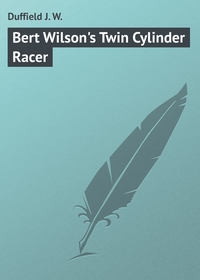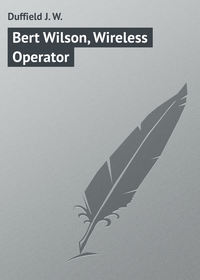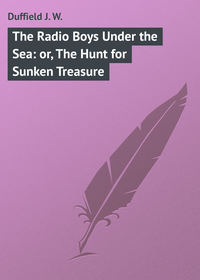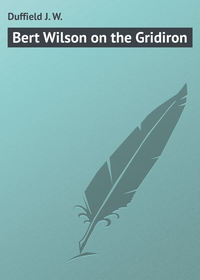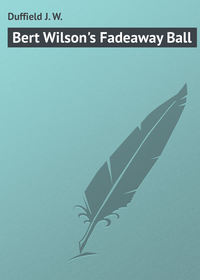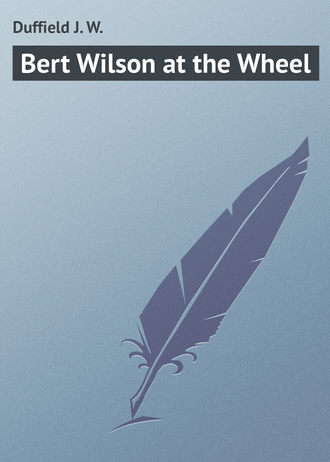 полная версия
полная версияBert Wilson at the Wheel
At that they all started back on the run and soon had Jim in such a good humor that he even told them how he had escaped being found out by a narrow margin many a time, and that nobody but Bert had even suspected the cave’s existence.
They all piled into the “Red Scout” in a hurry because they feared that Mr. Hollis would worry on account of their prolonged absence.
They arrived at “Campers’ Crossing” just in time to carry the last barrel of provisions. When they reached the new camp the boys were surprised to see how much had been done in their absence. The tents had been set up and from the mess tent came the clattering of utensils and the savory odor of creamed salmon on toast.
Soon, the call to dinner was heard, and the boys all gathered around the table, chattering like magpies.
“It seems as if we’d always camped here,” said Shorty. “There’s something about the place that makes you feel at home right away.”
“It’s the classiest place I’ve ever been in,” Dave Ferris declared, enthusiastically. “It makes you imagine that Nature might have had a little time on her hands and devoted it to making this one spot a little paradise.”
“Hear! Hear!” Tom cried, clapping his hands in mock praise. “Dave will be a poet if he doesn’t look out. Give us some more, old man, the sample’s good.”
“You’d better be careful how you
“‘Beard the lion in his denThe Ferris in his hall,’”said Dick Trent, warningly. “He won’t favor us with any more stories if you are not careful how you offend him.”
“I’d just as soon he’d spout all the poetry he wants to if it relieves him any, as long as he doesn’t forget how to tell stories,” Shorty remarked as he contentedly munched a piece of toast.
“How very kind of you,” said Dave, sarcastically. “I thank you with all my heart for your liberality.”
“My which? Say, Dave, if that ever belonged to me, I call you all to witness that I disown it from this time on. It’s no friend of mine from this time on.”
“You’d better hang on to it, Shorty. It’s the best kind of thing to have around at times,” said Mr. Hollis, as he rose to leave the table.
In the afternoon scouting parties were sent out in all directions to find out the nature of the surrounding country. Steve Thomas, Bert, Tom, Bob, Shorty, and Jim Dawson were sent off to scour the woods in an easterly direction from the lake.
For a considerable distance they tramped along, talking of the different plants and shrubs they came across and naming the birds they saw in the trees. They threw peanuts to the squirrels that peeped inquiringly at them from branches over their heads or ventured shyly from the shelter of their holes. They imitated the clear notes of the birds until the little songsters paused to look wonderingly at these strange creatures that could not fly and yet sang like themselves. Timid little rabbits watched the boys with soft, brown eyes, not knowing whether or not to sally forth from their security even for the tempting carrot that Bert held out so coaxingly. When he threw it at a distance, however, one little fellow, braver than the others, his appetite overcoming his fears, ran forth quickly, snatched the carrot and scurried back in a panic to his burrow, where, with his bright eyes fixed on these humans who had been so kind to him, he ate contentedly.
Suddenly the quiet woods rang with shouts and cries, the barking of a dog and the noise of people running to and fro furiously. Alarmed, the boys started on a run for the place from which the cries seemed to come. They fairly gasped when they came upon the cause of all the commotion. Three men, of the roughest order, were dancing distractedly around, trying to beat off a swarm of bees that surrounded them, and yelling like mad, while a big collie dog, wild with excitement, barked with all his might.
“Say, this is better than a circus,” Shorty shouted, “only I’m glad that those hoboes and not I are the whole show now.”
“Shut up, Shorty. The question now, is, what we can do to help the poor fellows out,” said Tom; then, turning to the tramps, he yelled, “You’d better make a dive for the brook and get under water. It’s right through the trees to your left,” he added, as the men, now nearly crazy with pain, started to follow his advice.
Rushing frantically to the brook, they plunged in head first, while the bees, deprived of their prey, flew off angrily into the woods to search for new victims upon whom they might vent their spite. When the tramps came up, dripping from the water, they were a sight to behold. Their faces were swollen so that their eyes seemed to be mere slits and their ears appeared to be twice their natural size.
The boys at once ran to get mud to put on the red, angry wounds. The tramps submitted with indifferent grace to the treatment, grumbling that they “didn’t see what good being all smeared up with mud was going to do.”
As soon as the boys had done what they could to ease the pain, the tramps declared that they would have to be moving on “because them pesky critters might come back to finish up their business.”
So the boys watched the strange company of sullen, muttering men disappear through the trees. As they were lost to view, the comical side of the adventure struck Shorty and he began to laugh and the longer he laughed, the harder he laughed. The others caught the infection and in a second the woods were ringing with the unrestrained roars of the boys. They laughed until they could laugh no more and then lay on the grass, gasping for breath.
“Oh, they did look so funny!” said Shorty between gasps. “I never shall forget that sight until my dying day.”
At that minute Bert sat up suddenly, exclaiming, “Fellows, look who’s here!”
With one accord they turned and saw the collie which they had entirely forgotten, sitting near and regarding them with inquiring, wistful eyes.
“Come here, Beauty,” Bert called, and the dog came unhesitatingly and stuck his cold, black muzzle in Bert’s hand.
“Did they desert you, old fellow?” Bert asked, putting his arm around the dog’s neck.
The collie waved his beautiful brush and, lifting his soft eyes to Bert’s face saw something there that made him his slave forevermore. For the collie, with true dog instinct, had recognized that in Bert he had a friend.
“I wonder where those tramps got him.” “Probably swiped him.” “Doesn’t look as if he’d had very good treatment.” “He doesn’t and it’s a shame, too. Isn’t he a beauty?” were some of the comments of the boys as they gathered around the dog, patting his head gently. The collie waved his tail and in his eyes was a great longing for sympathy and love. And you may be sure the boys gave him what he asked for.
Tired out, the boys finally went back to camp, followed by their new friend who soon became a favorite with everyone. That night Don, as they called the dog, sat with the rest around the camp fire and answered whenever they spoke to him with a wave of his silver brush. Bert made him a bed on the floor of his tent and Don gladly took possession of it. Just before he got into bed Bert put his hand on the dog’s head, saying, “I guess we’re going to be good friends aren’t we, old fellow?”
And Don, looking up in his master’s face, with eyes that held a world of gratitude and love, answered to Bert’s entire satisfaction.
CHAPTER VI
Shorty Goes to the Ant
The next morning, when the boys drew aside the flaps of their tents, the sky was dark and lowering. A good many anxious glances were thrown at the clouds and open disapproval of the outlook was not slow in breaking out.
“Gee, what a fearful day,” said Jim.
“You bet it is,” chimed in Shorty.
“That’s our luck,” wailed Dave, “just when I wanted to go to town to get a new blade for the jack-knife I broke yesterday.”
“Oh, come off, you pessimists,” sang out Bert, who had just plunged his head in a bucket of cold water and now was rubbing his face until it shone, “somewhere the sun is shining.”
“Heap of good that does us,” grumbled Shorty, “but say,” as he turned to Bert suspiciously, “what sort of thing was that you called us?”
“I said you were pessimists.”
“Well, what does that jawbreaker mean?”
“Why,” said Bert, who could not resist his propensity to tease, “that means that you are not optimists.”
“Worse and worse and more of it,” complained Shorty.
“That’s just as clear as mud,” echoed Jim.
“Well,” said Bert, tantalizingly, “listen my children – ”
“‘Listen, my children and you shall hearOf the midnight ride of Paul Revere,’”chanted Frank, who had recited that identical poem in his elocution class at the last term of school.
A well-aimed pillow made him duck, and Bert resumed:
“You see, Shorty, it’s just like this: The optimist is the fellow that sees the doughnut. The pessimist sees only the hole in the doughnut. Now, for my part, there is no nourishment in the hole, but there’s lots of it in the doughnut.”
“Aw say, don’t make a fellow’s mouth water,” said Shorty, before whose practical vision rose up his mother’s kitchen, fragrant with the smell of the crisp, brown, sizzling beauties, as they were lifted from the pan, “and me so far from home.”
If there were no doughnuts at the breakfast to which all hands came running, their place was more than taken by the golden corn bread and the savory bacon that formed the meal to which they sat down with all the enthusiasm of hungry boys. The food disappeared as if by magic and the table had been replenished more than once before the boys cried enough. Many a sated millionaire would have willingly exchanged a substantial part of his hoarded wealth for one of those unjaded appetites. But in pure, undiluted satisfaction, the boys would have been the losers by the exchange.
That very thought struck Mr. Hollis as he watched the havoc made at table by these valiant young trenchermen, and, turning to Dick, who sat at his right, he spoke of the starving King Midas. Jim, who overheard the name, which, as he said “was a new one on him,” wanted to know who Midas was, and how, if he were a king, he couldn’t get grub enough to keep him from starving. The boys, who had by this time taken the first keen edge off their appetite, were equally eager to hear the story, and Mr. Hollis went on to tell about the avaricious king of the olden time who could never get enough, but was always asking the gods for more. After a while they became wearied and disgusted and granted his request that everything he touched should turn to gold. The king was delighted at this beyond all measure. Now, at last, he was to have his heart’s desire. He put the gift to the test at once. He touched his sword and it changed to gold. That was fine. He stroked his beard and every hair became a glistening yellow spike. That wasn’t so fine. He began to get a little worried. Wasn’t this too much of a good thing? Well, anyway there was no use in fretting. He would go to dinner and get his mind off. But when he touched the food, it too became gold. He lifted a goblet of wine, only to find that it held molten metal. In the midst of plenty, he was starving. Upon his knees, he begged the gods to take back their fatal gift, and, thinking he had learned his lesson well, they did so. His gold vanished, but, oh, how delicious was the first taste of food. “And to-day,” concluded Mr. Hollis, “there is many a millionaire whose gold doesn’t give him the pleasure that a square meal gives the ravenous appetite of a healthy boy.”
“Well,” said Tom, expressing the general sentiment, “I’d sure like the money, but, oh, you corn bread.”
After breakfast, the boys broke up into separate groups. One went off under the guidance of Mr. Hollis to gather some fossils that were to be found in great abundance in the limestone that jutted out from a quarry at a little distance from the camp. Another group of the fellows with Dick in charge, who were especially interested in bird and insect life – the “bug squad” as they were commonly and irreverently referred to in camp – went to a little clearing about half a mile away that was especially rich in specimens. The day before, Tom had secured an uncommonly beautiful species of butterfly that topped anything in his experience so far, and the other boys wanted to add one to their rapidly growing collection. Whether the lowering day had anything to do or not with the absence of these fluttering beauties who love the sunshine, their search was without result, and after two hours spent in this way they threw aside their butterfly nets and sat down in the shade of a spreading beech to rest and as Shorty called it “to have a gabfest.”
Almost directly beneath the eastern branches was a large mound nearly three feet above the surrounding level and perhaps twenty feet in circumference. As Shorty flung himself down on the centre of the mound, a curious expression came into the eyes of Dick. He glanced quickly at Frank, who returned his look and added a wink that might have aroused suspicion in Shorty’s mind, had not that guileless youth been lying stretched out at full length with his hat over his eyes. The warmth and general mugginess of the air saturated almost to the raining point, together with the constant activity of the last two hours, had tired him out, and after a little badinage growing less and less spirited, he began to doze. The other boys who had been given the tip by Frank and Dick, let the conversation drag on purpose, and with a wicked glint of mischief in their eyes watched the unsuspecting Shorty slip away into the land of sleep. Soon his arms relaxed, his chest rose and fell with his regular breathing and horrors! an undeniable snore told that Shorty was not “faking,” but was off for good.
From being a spot of perfect peace and quiet, the mound suddenly burst into life. From numberless gates a swarm of ants issued forth and rushed about here and there to find out the cause of this invasion. The weight of Shorty’s body and his movements as he composed himself for sleep had aroused them to a sense of danger and they poured out in thousands. Soon the ground was covered with little patches of black and red ants, and as though by common consent they began to surround the unconscious Shorty. Some crept up his legs, others his arms, while others climbed over his collar and slipped inside.
First, an arm twitched violently. Then a sleepy hand stole down and scratched his leg. The boys were bursting with laughter, and Tim grew black in the face as he crowded his handkerchief into his mouth. Shorty shook his head as a horse does when a fly lights on it. Again he twitched and this time seemed to realize that there was something wrong. Still half asleep, he snapped:
“Aw, why don’t you fellows quit your kidding? Stop tickling me with that – ”
A yell ended the sentence as a nip more vicious than usual brought Shorty to his feet, this time wide awake beyond all question. He cast one glance at the boys, who now made no pretence of restraint but roared with laughter. Then he saw the swarm of ants surrounding him and took in the situation. He tore his hat from his head, his coat from his shoulders, shook off his tormentors and spinning around like a dancing dervish, dashed off toward the brook. A moment later there was a splash and they heard Shorty blowing, spluttering, diving, rubbing, until finally he had rid himself of the swarms that clung closer to him than a brother.
At last he succeeded and came up the bank. Before resuming his clothes, he had to take each garment separately and search every seam and crease to make sure that not a single ant remained. Then he came back into the group like a raging lion. His temper never was any of the best, and the sudden awakening from sleep, the stings and ticklings of the invaders, and perhaps most of all, the unrestrained laughter of the boys had filled his cup to the brim. He “saw red,” as the saying is, and regardless of age and size was rushing toward the rest with doubled up fists and rage in his heart, when Dick caught him by the wrists and held him in his strong grasp until his fury had spent itself somewhat and he began to get control of himself.
“Phil,” said Dick – he never called him Shorty, and at this moment that recollection helped to sober the struggling boy – “remember that the first duty of boy or man is to control his temper. The boys didn’t mean any harm. It looked to them like a splendid joke, and perhaps we let it go a little too far. I am really to blame more than any one else because I am older and in charge of the squad. I’m awfully sorry, Phil, and I beg your pardon.”
The kindly tone and sincere apology were not lost on Phil, who was not without a sense of humor, which through all his anger began to struggle to the surface. The other boys, too, thoughtless and impulsive though they might be, were sound and kind at heart, and following Dick’s example crowded about Phil and joined in the apology. The most flaming anger must melt before such expressions of regard and goodwill and Phil was at last compelled to smile sheepishly and say that it was all right.
“You’re a sport, Phil, all right,” called out Frank, and at this highest of commendations from a boy’s point of view, the last vestige of Phil’s resentment faded away.
“Well, anyway, fellows,” he said, “I don’t bear any grudge against you, but I am sure going to get even with those pesky ants. I never did care much for ants anyway. I’ve been told so often to ‘go to the ant, thou sluggard,’ that now I’m going to them for fair, and what I do to them will be a plenty.”
As he said this, he turned toward the ant hill as though to demolish it, but Dick put up a friendly hand:
“No, Phil,” said he, “you wouldn’t destroy a wonderful and beautiful palace, would you?”
“Palace,” said Phil in amazement, thinking for a moment that Dick was “stringing” him. “What do you mean by that?”
“Just what I say,” returned Dick; “a wonderful and beautiful palace. There is a queen there and she walks about every day in state, surrounded by a throng of courtiers. There are princesses there that are taken out daily to get the air, accompanied by a governess, exactly as you have seen a group of boarding-school girls walking out with their teachers. Surrounding the palace is a city where there are hundreds of carpenters and farmers and sentinels and soldiers. If you waited round a while, you would see the farmers going out to milk their cows – ”
At that point, Dick was interrupted by a roar of laughter that burst from every boy at once. They had listened in growing amazement that had rapidly become stupefaction, but this was really too much. What was the matter with Dick? Was it a joke, a parable, a fairy story? They might be kids all right, but there was a limit to everything, and when Dick talked of ants going out to milk the cows – well! It was up to him to explain himself or prove his statement, and that they felt sure he could never do.
Dick waited good-naturedly while they pelted him with objections and plied him with questions. Then he took from his kit a strong magnifying glass and told them that he was going to prove to them all what he had said.
“He laughs best who laughs last,” he said, “and I am going to show you that all I said is true. That is,” he modified, “I cannot prove everything just now, as I would have to destroy this wonderful palace if I were to try to show you how marvelous it is and how perfect in all its appointments. But what we don’t see ourselves has been seen time and time again by hundreds of wise and truthful men, and their testimony is as strong as though it were given under oath in a court of law.”
“Well,” said Frank, “I’m willing to take everything else on faith, but I’m afraid I’d have to see the milking done myself in order to believe it.”
“All right,” said Dick, “as it happens that is just the thing I can show you more easily than anything else.”
The boys crowded eagerly around him.
CHAPTER VII
The Ants Go Milking
“You know,” said Dick, as the boys threw themselves down at the side of the mound and looked at it with an entirely new interest, “if these were African ants, you wouldn’t be taking any such liberties with them. Instead of hanging around this mound you would be running away like all possessed. And if you didn’t make tracks in a hurry the only thing left here would be your skeleton picked as clean as the one you saw the other day in old Dr. Sanford’s office.”
“What?” cried Jim, “do you mean to say that I would run away from a little thing like an ant. Not on your life, I wouldn’t.”
“Let’s see,” said Dick, “you’d run away from a boa-constrictor, wouldn’t you?”
“Who wouldn’t,” retorted Jim.
“Well, if you’d run away from the boa-constrictor, and he’d run away from the ants, where do you get any license to face the ants.”
“Do you mean to say that those monster snakes are afraid of such tiny things?”
“I should say they were,” replied Dick, “the ants go from place to place through the great African forest in countless numbers, millions at a time, a regular army of them. Nothing can stand before them. They strip every shrub, eat every blade of grass. They swarm over every living thing they find in their way. Sometimes they come across a snake unawares, and climb all over him. He squirms and twists and rushes away, trying to brush them off, against the bushes. At last he turns and bites frantically, but they never let up. They actually eat him alive, and in less than ten minutes they pass on leaving his bones picked clean as a whistle. The natives take their wives and children and flee for their lives whenever they see an army of ants approaching.”
“But that, of course, has nothing to do with these little American neighbors of ours. They are perfectly harmless and though they are fierce scrappers among themselves, inflict no injury on any one else. And there is nothing in the whole animal or insect world, except perhaps the bees, that have a society and government so much like that of men.”
“In one respect they are like their African brothers and that is in their fondness for travel. Every once in a while they make up their minds to emigrate and then they fly in swarms of millions – ”
“What?” interrupted Frank, “do you mean to say they fly? I never knew that an ant had wings.”
“Of course they have,” said Dick, “they often have to cross rivers to get to their new home. How could they do that without wings?”
“Oh, I don’t know,” hummed Shorty:
“The bed bug has no wings at allBut he gets there just the same.”A rather severe glance from Dick quenched Phil’s exuberant spirits which had all come back to him since his ducking.
“Now,” continued Dick, “these swarms are sometimes so vast that they darken the sun in certain localities. Men working on high buildings have been surrounded and almost blinded by them. While these emigrations last they are a bother, if not a peril, and the only ones that are really happy are the fish in the brooks and rivers over which they pass. Sometimes the surface is fairly black with them and the trout and little troutlings have the time of their lives. Once the flight is ended, however, and the new locality chosen, the wings disappear. Nature has no use for needless things and from that time on the air knows them no more. The carpenter ants get busy right away. The place is marked off as accurately as a surveyor marks out a plot in the suburbs of a city. The queen ant is given a royal room apart from all the others. She is a good mother and takes the best of care of her little ones. As they grow older, they in turn help the queen to care for their little brothers and sisters. They are excessively neat and clean in their personal habits. They spend hours preening and combing and cleaning until they are immaculate – ”
“Regular dudes,” muttered Jim.
“Well,” said Tom, “that’s something that will never be laid up against you, Jim.”
Jim, who indeed had a hard time keeping up to a high ideal of cleanliness, and whose hair was usually tumbled while his nails too often were draped in mourning, looked a little confused, and while he was thinking up something to hurl back at Tom, Dick went on.
“There is one thing, however, about the ants that I don’t admire. They like to get somebody else to do their work. A certain number of their own colony are ‘hewers of wood and drawers of water’ for the rest. Indeed, the aristocrats among them get so lazy after a while that they will not even feed themselves. The workers not only have to hustle for the grub, but actually have to feed it to the lords and dukes. And talking of hustling for grub, just look here.”


